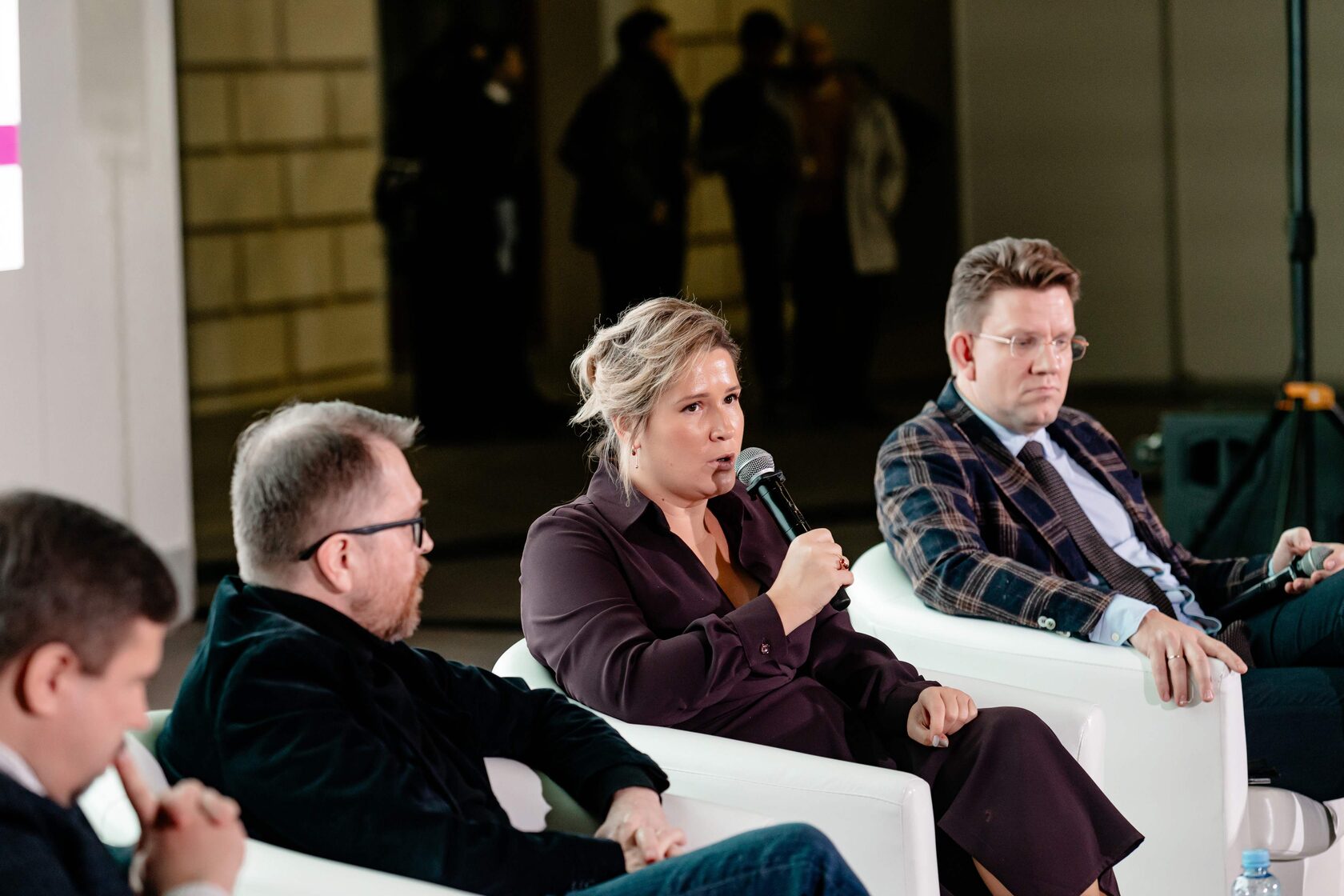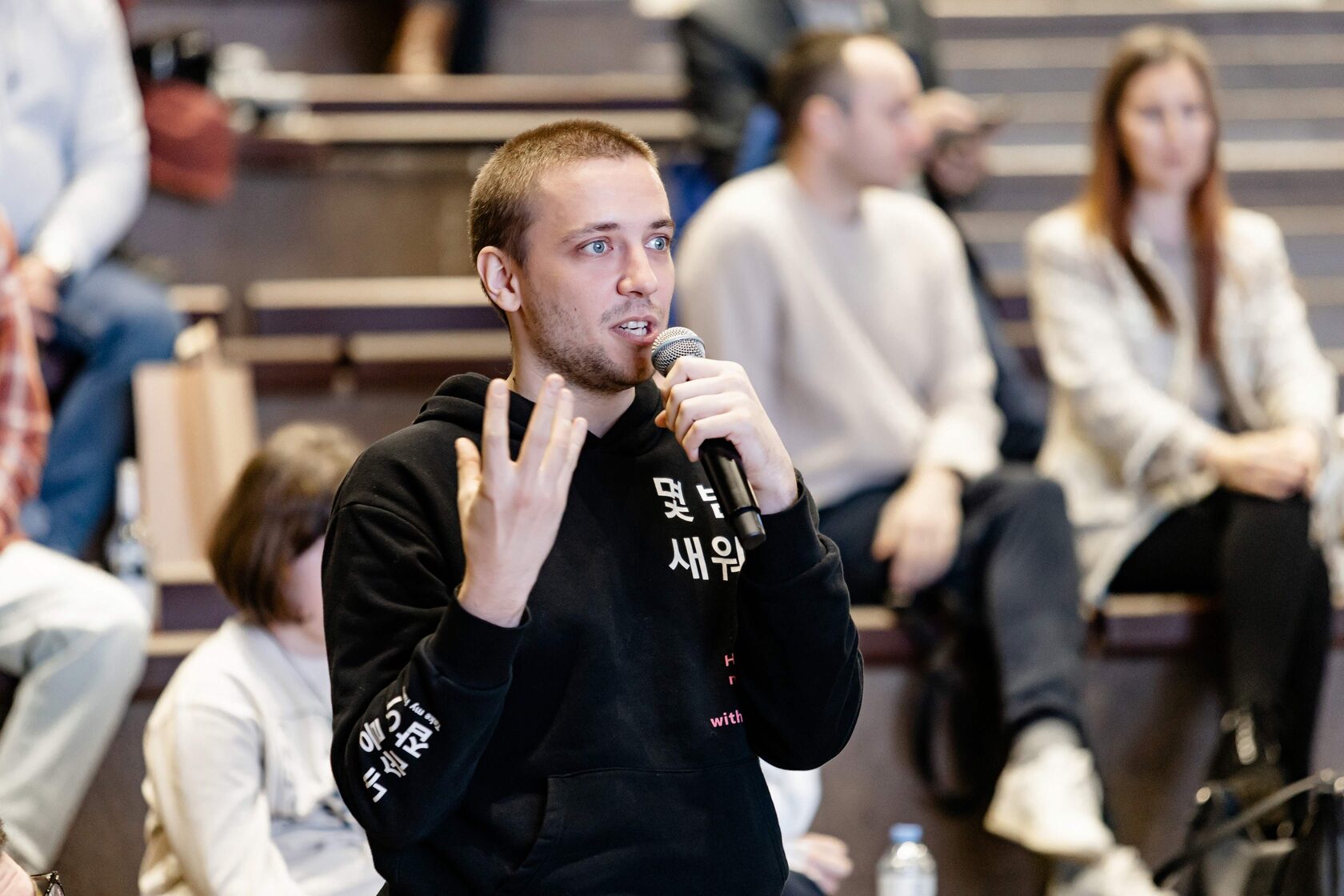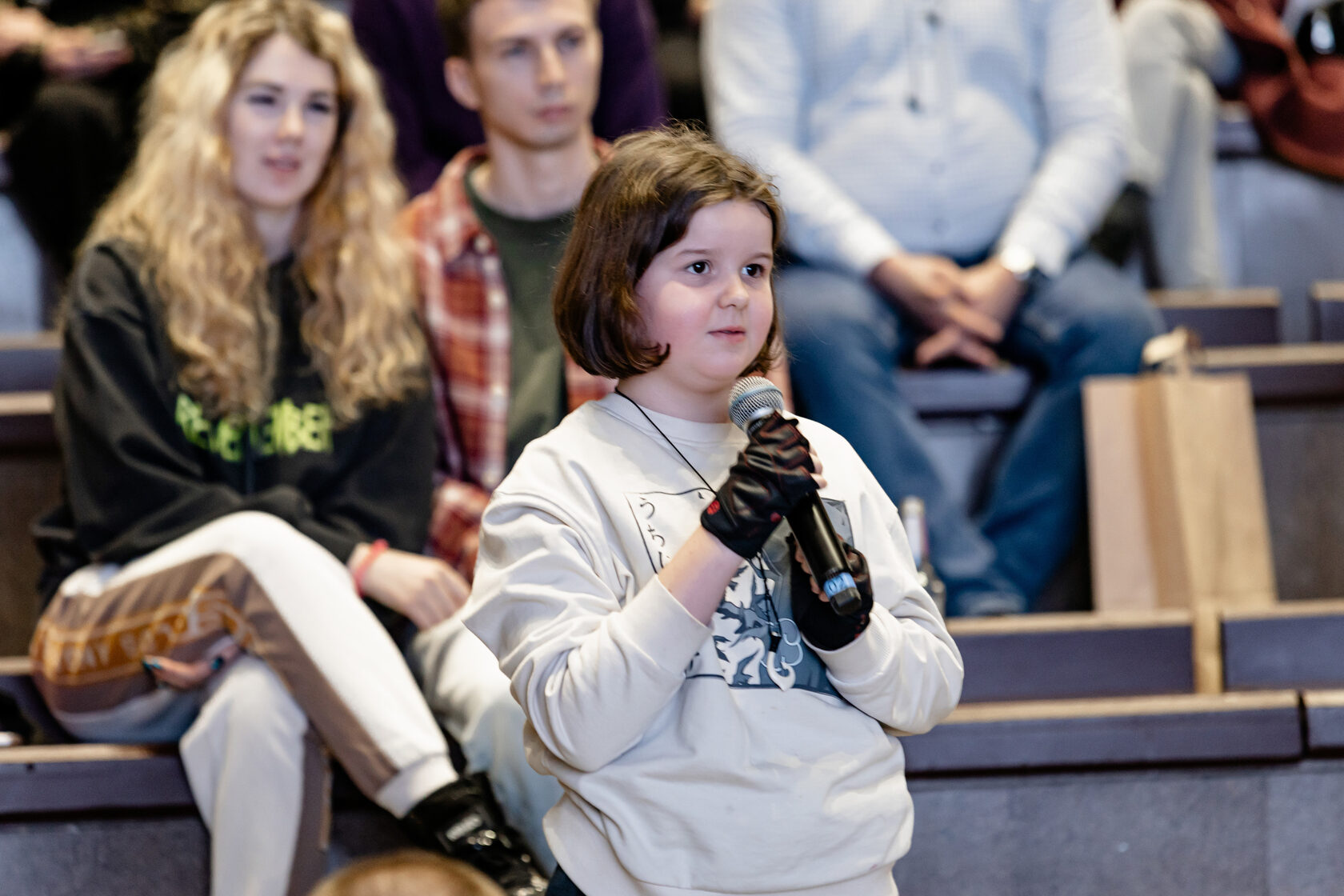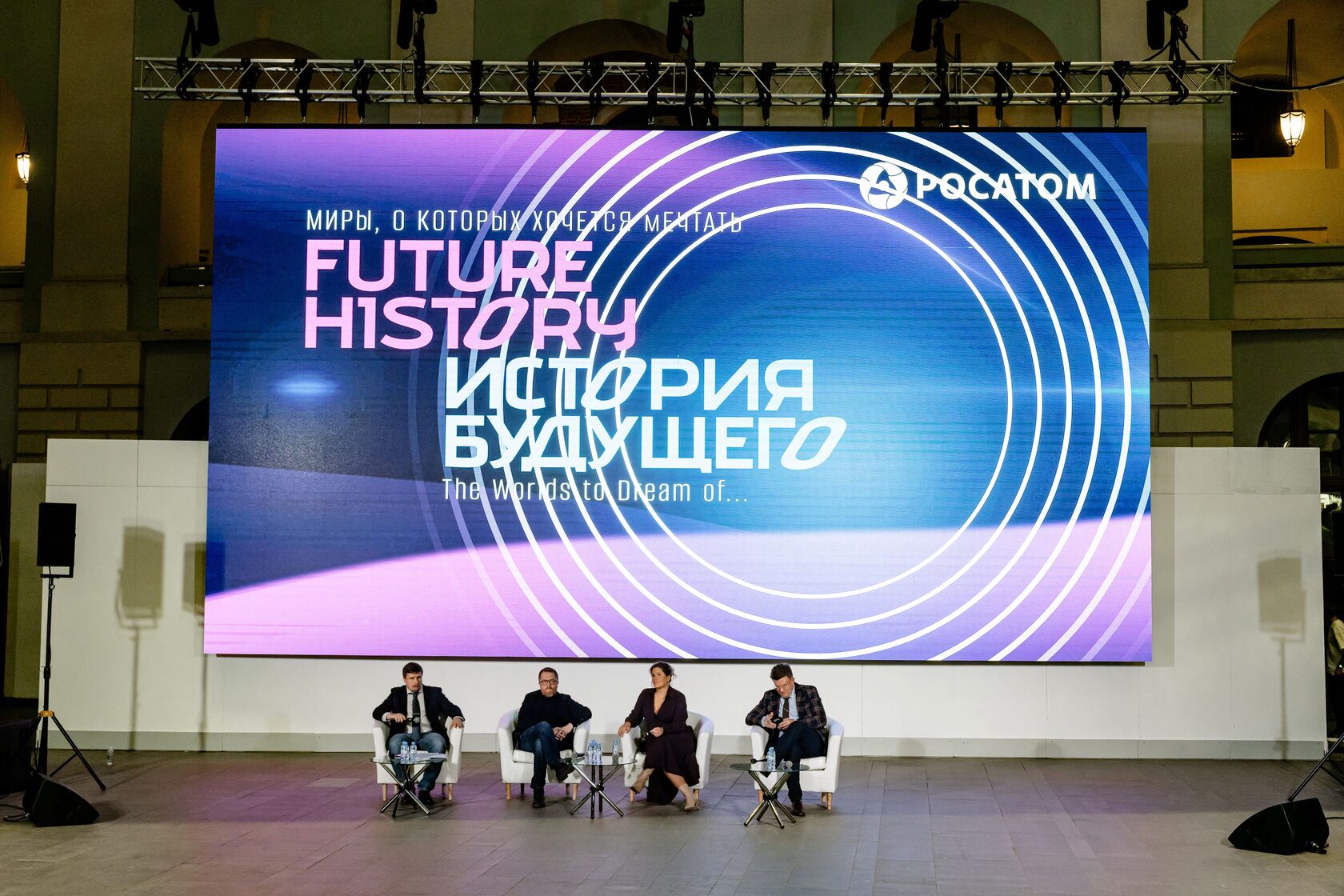On December 5 in Moscow, at the intellectual literature fair "non/fictioN26", a ceremonial presentation of the International Literary Award in Science Fiction "Future History" took place.

The presentation of the "Future History" award was held in an unusual discussion format, featuring the general director and general producer of the animation company "YARKO" Albina Mukhametzyanova, Honored Artist of the Russian Federation, chairman of the "Future History" award jury Andrey Gelasimov, and the general director of the "Eksmo" publishing house Evgeny Kapyev. The moderator was the award's executive secretary, science fiction researcher Sergey Shikarev.
The speakers discussed the dipiction of science fiction universes on screen and the lack of quality science fiction films in contemporary Russian cinema. The participants agreed that producing works of high quality requires a bright idea, good literary style, and interesting script elements that can make a film cost-effective without compromising quality. Albina Mukhametzyanova, an expert in children's media content, noted that today there is a great demand not only for literature but also for good science fiction films and animation.
The speakers discussed the dipiction of science fiction universes on screen and the lack of quality science fiction films in contemporary Russian cinema. The participants agreed that producing works of high quality requires a bright idea, good literary style, and interesting script elements that can make a film cost-effective without compromising quality. Albina Mukhametzyanova, an expert in children's media content, noted that today there is a great demand not only for literature but also for good science fiction films and animation.

“There is a clear audience demand for science fiction – we can see that. A good recent example is One Hundred Years Ahead, which grossed 1.5 billion rubles at the box office and is among the top five highest-grossing films of the year. What’s needed is a compelling story that resonates with a wide audience. That’s exactly why the Future History award is necessary – to foster new ideas,” emphasized Albina Mukhametzyanova, General Director and General Producer of the animation company YARKO.
The participants of the presentation encouraged writers not to shy away from using neural networks. Andrey Gelasimov noted that artificial intelligence can be used just like the internet – as a tool for gathering information: “Do use LLMs! They will provide you with a broad range of material you can reflect in a book. AI models gather data from all scientific research and take into account every major scientific breakthrough around the world.”
Evgeny Kapyev, General Director of the publishing house Eksmo, shared his experience of using AI in literary work: “We carried out a large project using ChatGPT and other neural networks. We created a high-quality synopsis for a book, developed characters and a plot. It took us about two weeks. Our colleagues in the film industry were able to create a video promo for a future TV series based on this synopsis. The product turned out to be of such high quality that the filmmakers are now preparing to pitch the series for production. Of course, neural networks don't replace human work, but it’s important not to reject high-tech assistance.”
Answering a provocative question by an audience member who doubted the possibility of modern science not having a scenario of humanity’s extinction, Andrey Gelasimov emphasized that this is precisely why there’s a need for an award that encourages authors to write optimistic science fiction.
“Indeed, a huge portion of modern science fiction – largely influenced by our overseas colleagues – has turned entirely toward post-apocalyptic themes. It’s easy to build conflict when there’s a mega-villain or antagonist. But look at Richard Morgan’s novel and the series Altered Carbon – they managed to create a gripping narrative without destroying humanity. Instead, they presented a powerful drama in a science fiction setting,” said Andrey Gelasimov.
The participants of the presentation encouraged writers not to shy away from using neural networks. Andrey Gelasimov noted that artificial intelligence can be used just like the internet – as a tool for gathering information: “Do use LLMs! They will provide you with a broad range of material you can reflect in a book. AI models gather data from all scientific research and take into account every major scientific breakthrough around the world.”
Evgeny Kapyev, General Director of the publishing house Eksmo, shared his experience of using AI in literary work: “We carried out a large project using ChatGPT and other neural networks. We created a high-quality synopsis for a book, developed characters and a plot. It took us about two weeks. Our colleagues in the film industry were able to create a video promo for a future TV series based on this synopsis. The product turned out to be of such high quality that the filmmakers are now preparing to pitch the series for production. Of course, neural networks don't replace human work, but it’s important not to reject high-tech assistance.”
Answering a provocative question by an audience member who doubted the possibility of modern science not having a scenario of humanity’s extinction, Andrey Gelasimov emphasized that this is precisely why there’s a need for an award that encourages authors to write optimistic science fiction.
“Indeed, a huge portion of modern science fiction – largely influenced by our overseas colleagues – has turned entirely toward post-apocalyptic themes. It’s easy to build conflict when there’s a mega-villain or antagonist. But look at Richard Morgan’s novel and the series Altered Carbon – they managed to create a gripping narrative without destroying humanity. Instead, they presented a powerful drama in a science fiction setting,” said Andrey Gelasimov.

Sergey Shikarev emphasized that one of the main goals of the award is to support authors who write true science fiction: “The award also values works filled with techno-optimism. Today, when dark visions of the future dominate science fiction, it is especially important to envision the coming world in brighter, more hopeful tones.”
Evgeny Kapyev also shared an important idea, noting the need to involve scientists in the creation of science fiction works. Alternatively, the author should devote time to reading scientific literature. Without this, it is impossible to produce high-quality science fiction, the publisher believes.
The Future History award was established by the Foundation for the Promotion of Scientific, Educational, and Communication Initiatives “ATOM” under the auspices of the State Corporation “ROSATOM”.
It will be awarded in three categories: Best Short Story; Best Short Story for Children and Teenagers; Best Short Story in a Foreign Language.
Applications can be submitted on the award’s official website: https://fhistory.ru/
Submissions from authors will be accepted from January 15 to July 20, 2025.
All information is also available on the award’s social media pages:
https://t.me/fhistory_official
https://vk.com/fhistory_official
The International Literary Award in Science Fiction Future History is the largest of all Russian science fiction awards in terms of prize fund – the total prize fund exceeds 5 million rubles.
Evgeny Kapyev also shared an important idea, noting the need to involve scientists in the creation of science fiction works. Alternatively, the author should devote time to reading scientific literature. Without this, it is impossible to produce high-quality science fiction, the publisher believes.
The Future History award was established by the Foundation for the Promotion of Scientific, Educational, and Communication Initiatives “ATOM” under the auspices of the State Corporation “ROSATOM”.
It will be awarded in three categories: Best Short Story; Best Short Story for Children and Teenagers; Best Short Story in a Foreign Language.
Applications can be submitted on the award’s official website: https://fhistory.ru/
Submissions from authors will be accepted from January 15 to July 20, 2025.
All information is also available on the award’s social media pages:
https://t.me/fhistory_official
https://vk.com/fhistory_official
The International Literary Award in Science Fiction Future History is the largest of all Russian science fiction awards in terms of prize fund – the total prize fund exceeds 5 million rubles.
